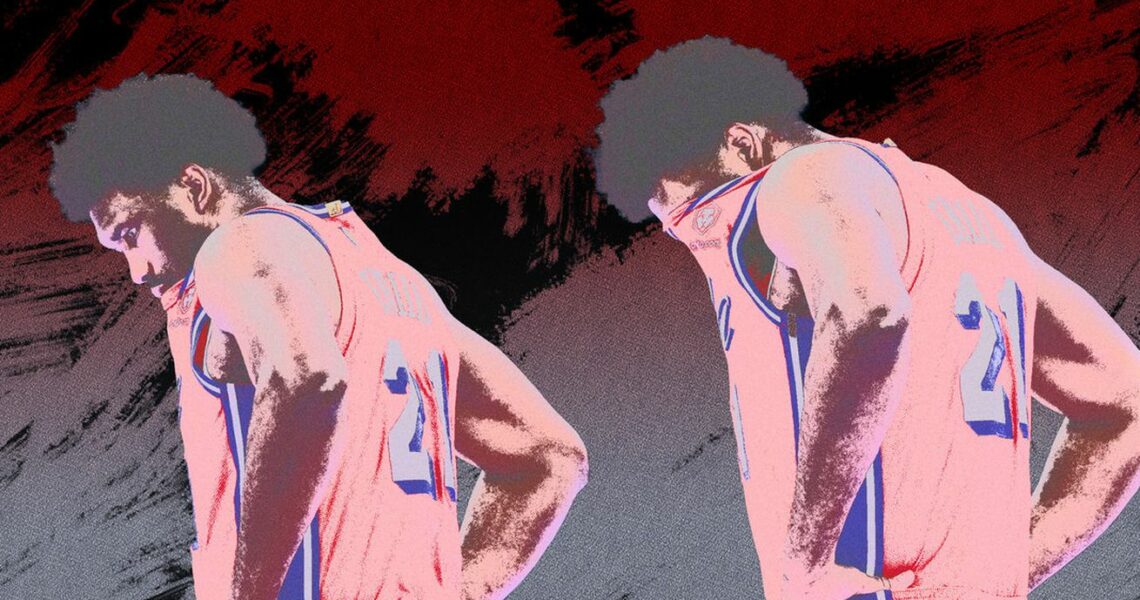
Philadelphia was 27 seconds away from squaring its series with New York; now it faces a dreaded 0-2 hole. But Game 2 provided at least one reason to believe that a comeback remains possible.
If you’re the Philadelphia 76ers, Monday night’s Game 2 collapse yielded devastating news, but also one pretty good reason to feel cautiously optimistic about the rest of the first-round series against the New York Knicks. Let’s start with the bad first.
Up five with 27 seconds to go, Philly gave up a corner 3 to Jalen Brunson and then, instead of calling timeout to advance the ball, turned it over in chaotic fashion as Madison Square Garden physically shook.
“The first thing is obviously they score, we take a look at getting it in quick,” Sixers head coach Nick Nurse said after the game. “We don’t get it in quick. I call timeout. Referee looked right at me. Ignored me.” Before speaking with the media, Nurse watched a replay of the possession and reiterated that an official “could see me clearly calling timeout twice.”
Alas, no timeout was granted. Five seconds later, the sky fell. Donte DiVincenzo missed a wide-open 3. Isaiah Hartenstein flew in for the offensive rebound and then shoveled it over to OG Anunoby, who found DiVincenzo again, this time for a go-ahead, eventually game-winning jumper that triggered pandemonium among the delirious crowd, which suddenly found itself living through a basketball fantasy.
It was the type of ending—defined by avoidable mistakes and gut-turning controversy—that can effectively end a team’s season. Maybe it will. The Sixers are now down 0-2 against a tough-as-nails 2-seed that has yet to benefit from Brunson looking like the MVP candidate he’s been all year.
Philadelphia isn’t a typical no. 7 seed, though, which brings us to that pretty good reason for it to feel cautiously optimistic about the rest of this series. His name is Joel Embiid. And in Game 2, despite not looking or moving like he does when 100 percent healthy, Embiid was still the life jacket Philly will need if it wants to pull through this series.
Embiid can’t routinely bully Hartenstein and Mitchell Robinson on the block, demand double-teams, then pick rotating defenses apart like he does when he has full trust in both knees. After missing nearly the final two months of the regular season, his burst and stamina still aren’t close to where they are at his peak. But the version of Embiid that was on display in Game 2 was still pretty much a best-case scenario. Two days after he crashed to Madison Square Garden’s floor with troubled eyes that communicated basketball tragedy, Embiid did this:
He finished with 34 points, 10 rebounds, six assists, and a monstrous 40.4 percent usage rate that included only two turnovers. “I thought he was excellent,” Nurse said about the 2022-23 MVP after the game. “Really, really outstanding.”
Watching Embiid on Monday night, I was reminded of something Minnesota Timberwolves color commentator Jim Petersen said on air during a random regular-season game earlier this year. To paraphrase: Embiid can score 30 without really trying. In this context, what it means is that even without any athleticism or force, this 7-footer still has enough skill and versatility to completely dominate a game. It’s a compliment to his talent and agility, the way he sets a screen and then moseys down to the nail, retrieves a pocket pass, and calmly drills an unblockable jumper. He shot 7-for-10 from the midrange in Game 2 and combined with Tyrese Maxey (who had a game-high 35 points and 10 assists) to execute a pick-and-roll that New York had no answer for. They tried just about everything, including aggressive, preemptive help from the weak side that led to a different kind of pain:
In 39 minutes, Embiid wasn’t particularly efficient—a 49.6 true shooting percentage is no bueno—but he was unstoppable for significant stretches. Philadelphia outscored New York by three points with him on the court. In the series, the Sixers’ offensive rating when Embiid sits is (somehow) 61.5.
On defense, he was a steely bouncer, clipboard in hand. Only 25 percent of all the Knicks’ shots came at the rim, and just 52.6 percent went in. That’s all Embiid, who spent the entire game either lounging in a deep drop or anchoring Philadelphia’s zone.
That coverage can be a double-edged sword, of course. And when Embiid is mobile enough to bother shooters on the perimeter and dance in different schemes, Philadelphia’s defense is obviously less vulnerable against real pull-up threats:
But most of the Knicks’ jumpers were inside the arc, looks the Sixers are OK with, knowing Nicolas Batum or Kelly Oubre Jr. is rushing in with a rear contest. Overall, Embiid’s presence was a clear positive on that end, instrumental to Philadelphia’s success.
The Sixers did more than have Embiid set screens and roll toward the free throw line, too. They found some success having Kyle Lowry set a flex screen for him out in the corner, an action that eventually set up this gem:
“He did a great job tonight of just being aggressive, being physical out there, being dominant like he is,” Tobias Harris said of Embiid. “We look forward to that for the next game.”
It’s far from controversial to believe that Philadelphia can come back and win this series if Embiid is who he was in Game 2. That player saved possessions that were going nowhere, delivering time and again as the hub of an offense that left some meat on the bone. Generally speaking, 0-2 deficits are daunting but hardly insurmountable in today’s league for a variety of reasons, including 3-point variance and the narrowing talent gap between higher and lower seeds. Teams down 0-2 have come back six times in the past three postseasons. If the Sixers are eliminated in four or five games, it’d be a tremendously disappointing end for a team that employs one of the best players alive, in the middle of his prime. Given the circumstances, it also shouldn’t necessarily be time to panic.
“We should be 2 and 0,” Embiid said at his locker. “So, we’re good. We’re gonna win this series. We’re gonna win this. We know what we’ve got to fix. We did a better job today. So, we’re gonna fix it. But we’re the better team. And we’re gonna keep fighting.”
Philadelphia has only a few players under contract for next season and enough financial flexibility to retool around Embiid and Maxey with (hopefully) a superior supporting cast. That’s another story for another day, though. In the here and now, despite Game 2’s disappointing loss, the Sixers are still a threat because their best player still looks like someone who can put a team on his back and carry them to the finish line.

